4. Music Spinning in Your Head
This time, development took a while, but in the latter half, you sped up. In video game development, the rush at the end often results in some good work. What happened to cause that?
Well, everyone came together and was like, “This is the direction we’re going!” From that point on we certainly sped up.
That was about the time the remixes started coming together. At that time, we were worried about how we should make them. Masaoka-san was testing the remixes, and they were looking really good, so we were like, “This’ll work!”
I think that was over a year ago.
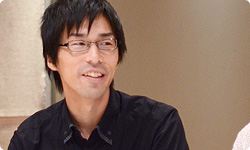
And toward the end, we suddenly increased the number of people working on it.
As with the previous game, I worked up toward the end with (Kyohei) Seki-san5 from the graphics team, but we added three more people when it came time to polish it up. Each staff member’s strengths had more of an effect than I had imagined. 5Kyohei Seki: Software Planning & Development Department, Software Planning & Development Division. He participated in the session of “Iwata Asks” about Rhythm Paradise for the Nintendo DS system.
Last time, we had a rather compact team, but this time it was about three times as much, comparatively speaking. Why do you think the additional people were able to fit into the team like that and function so well?
We had a young team and they were all fans of the previous game. And in order to introduce some variation, we would just offer some simple direction and basically leave the rest up to them. (indicating Yone-san and Masaoka-san) The way those two work together. (laughs)
Everyone can bring their own strengths to the fore, so they take responsibility themselves.
That’s right.
As I watched you, I felt as if you were pleased at the way something other than what you had imagined was appearing.
Yes, I looked forward to it each time, thinking, “I wonder what funny thing will happen today?”
I suppose it went well because everyone had played the previous games and shared a sense of what constituted their core. Yone-san, why did the sound go so well?
Two people who came in to work on the sound were also fans of the previous game. I didn’t decide for them how the sound needed to be, and instead gave instructions to draw out their individual characteristics.
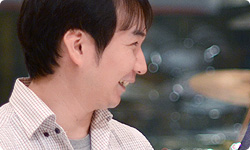
It may have been challenging material that was somewhat different from other games.
I suppose so. It was important to make the sound have impact, sound that would spin around in your head after you play.
I have a feeling that when musicians make music that gets stuck in people’s heads, they experience the highest sense of achievement.
That’s right. There’s something about music that causes it to repeat like a refrain in your head.
Tsunku-san has written a lot of songs that get stuck in your head.
When you play this series, you can’t help but play one more time, and when you do, that song is playing in your head the whole time. Masaoka-san, did you get more programmers?
One junior staff member came in, and we asked him to work on some of the Endless Games, which are apart from the main game. He is the type to offer opinions freely.
You’re praising him, right?
Oh, yes! That’s a compliment! He came up with all kinds of ideas that we hadn’t implemented yet. He bugged me and bugged me, and when we tried his ideas, they were great.
Usually when complimenting someone, you wouldn’t say they “bugged” you! Anyway, when you tried his ideas, they worked. (laughs)
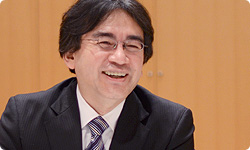
Yeah. He’s great to have in my team. When a new person looks at it from a new perspective and says what he wants, it changes the game. I really am praising him, you know!
(laughs)
What was it like seeing Nintendo’s output from time to time?
Well, I was able to enjoy the long-distance relationship between Tokyo and Kyoto more than anyone. In a long-distance relationship, if you don’t meet for a while, your girlfriend’s hairstyle and makeup change, and her taste in clothes and accessories changes, and those little differences can be striking. It was like that when we met, so it was all very fun. We at TNX make things, too, so every time we saw Nintendo’s know-how and ideas, we thought, we might be able to do something like that in our own work. Gleaning lots of hints like that was incredibly enjoyable.
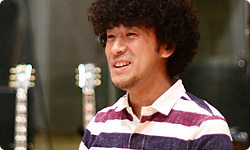
Come to think of it, Iida-san did some illustrations this time.
Oh, he did?
Uh, yeah. I came to Tokyo to work in music, but in Osaka, I had attended a school of design.
How did someone who went to a design school end up working in music? (laughs)
The answer could take a while.
Go ahead. Sometimes I ask things like this. (laughs)
Both my parents were like that. My father liked art. He worked in architectural design, and when he was young, he was in a jazz band. My mother liked music. As a student, she sang and played the marimba. My two brothers and I started learning the electronic organ when we were in Year 2 at primary school. On Sundays, my brothers and I would play with toy cars, and my father would draw them three-dimensionally on the backs of flyers. I was doing both music and art, and figured that one day I would have to choose one. Then I graduated from high school. While studying design, I was also in a band. Then when I was 19, I met Tsunku-san.
So you were going to school when you met Tsunku-san and that determined your path.
Yes. Just when I graduated from design school, I had the chance to come to Tokyo for music work, and here I am. I told Takeuchi-san about that, and he said, “Why don’t you draw something?” I drew the two comedian birds in the Endless Games called Manzai . I also handled some of the things they say. Editor’s note: The game Manzai is not available on versions outside of Japan due to the Japanese-dialogue focused nature of the game. It has been replaced with the game Mr. Upbeat for versions outside of Japan.
Right. Many of the voices that appear in this game are also recorded in-house.
Yeah. Everyone on the staff became a voice actor. (laughs)
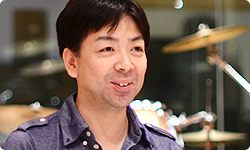
Everyone?
Not everyone, but quite a few.
How did you handle the voice casting?
It just so happens that the staff displays quite a variety of voice qualities, so we just said, “This person would be good for this character.”
Do you feel closer to the game because it has your own voice in it and your own illustrations moving around on the screen?
Rather than feeling closer, I feel more objective. I feel like a parent watching his child perform at a piano recital. I wonder if the players enjoy it.
(laughs) Like, “Does my child fit in all right?”
Yeah. “Is my kid all right?” And the staff members at Nintendo that we usually deal with tend to speak softly, so it was funny how when hearing them call out in the game, they sound incredibly lively!
Right. Like, “Oh, they can be loud!” (laughs)
The difference is amazing. I wonder why they’re usually so soft-spoken?
Sorry. I’m just always nervous in front of you… (laughs)
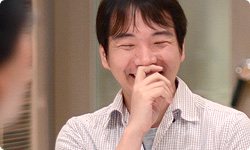
(laughs)